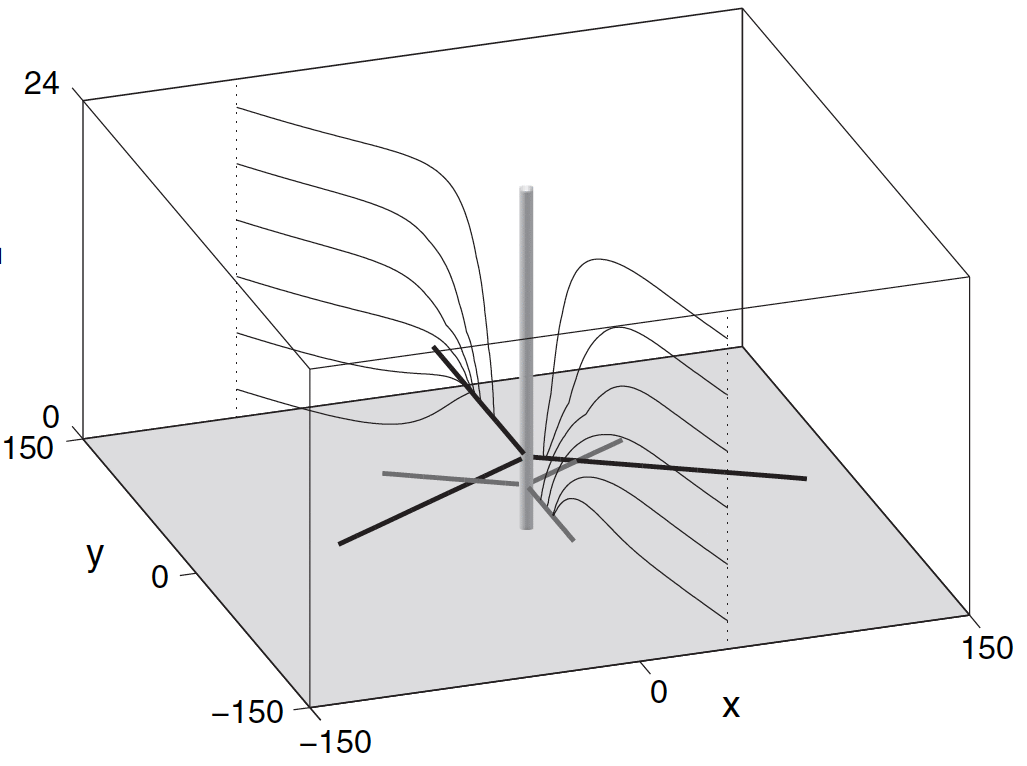Horizontal Well Hydraulics: Part 1
Predicting Production Rates of Horizontal Wells
and Radial Collector Wells
Learn to predict the production rate and radius of influence of a horizontal well or a radial collector well.
Well hydraulics for horizontal wells is considerably more complicated than for vertical wells. The flow patterns near horizontal wells are three-dimensional, while the flow toward vertical wells may be reasonably approximated as two-dimensional flow in the horizontal plane.
Analytic solutions for horizontal wells are limited, while three-dimensional numerical models are cumbersome in view of the high degree of grid resolution required near the horizontal well or laterals of the radial collector well.
Groundwater development in shallow aquifers, where vertical wells are less productive, is increasingly accomplished by horizontal wells as drilling techniques of these wells have improved. In the drinking water industry horizontal wells in the form of radial collector wells are increasingly used near or even with their "laterals" underneath surface water bodies to enhance production and limit treatment when compared to the direct pumping of that surface water (riverbank filtration).
This webinar focuses on predicting production rates of horizontal wells and radial collector wells. We do so using simple two methods: (a) calculator estimates and (b) two-dimensional models and incorporating the resistance to the converging (3D) flow near the laterals.
This approximate technique is even possible when laterals extend underneath surface water bodies. We will see that the predicted production rates are within a few percent of those derived from fully three-dimensional models.

Radial Collector Wells Vertical Flow Net
Bakker et al. 2005 in Groundwater
Webinar Topics:
- Start with the basic solution for ground water flow toward a horizontal drain.
- Step-wise procedure to convert a solution from a drain to a horizontal well.
- Developing a two-dimensional model for a radial collector well with multiple laterals.
Take-A-Aways from this webinar:
- Learn when 3D flow effects are important.
- Learn how to predict the production rate of horizontal wells.
- Learn how to predict the production rate of radial collector wells.
- Learn strategies to delineate "wellhead protection areas" for horizontal wells or radial collector wells.
"The webinar (about Horizontal Well Hydraulics) was great quality (sound and visual) and the presentation was informative and accessible. I also appreciate the amount of reference materials provided so I can dig deeper into the math if and when I need to."
- Michael Sherwood, PG, Geologist/Hydrologist, O'Connor Environmental, Inc.
Instructors Bio
Henk Haitjema, PhD
 Henk Haitjema, PhD is the Editor-in-Chief of NGWA's Groundwater. He is also Professor Emeritus at Indiana University where he taught groundwater flow modeling and applied mathematics at the School of Public and Environmental Affairs.
Henk Haitjema, PhD is the Editor-in-Chief of NGWA's Groundwater. He is also Professor Emeritus at Indiana University where he taught groundwater flow modeling and applied mathematics at the School of Public and Environmental Affairs.
He is internationally recognized for his mathematical modeling of groundwater flow. He is the author of the popular groundwater model "GFLOW" (since 1994) and a book "Analytic Element Modeling of Groundwater Flow" (Academic Press, 1995).
Dr. Haitjema received his Masters degree in Civil Engineering from the Technical University of Delft, The Netherlands (1976) and his Ph.D. in Civil Engineering from the University of Minnesota (1982).